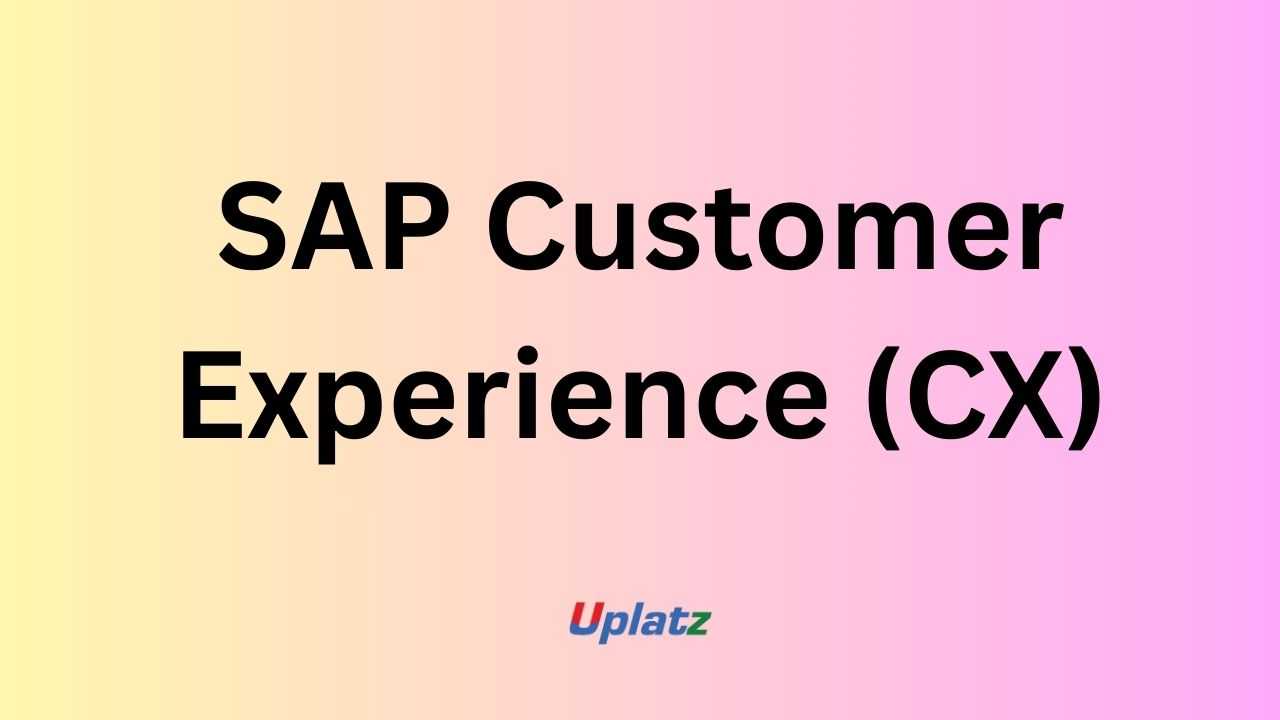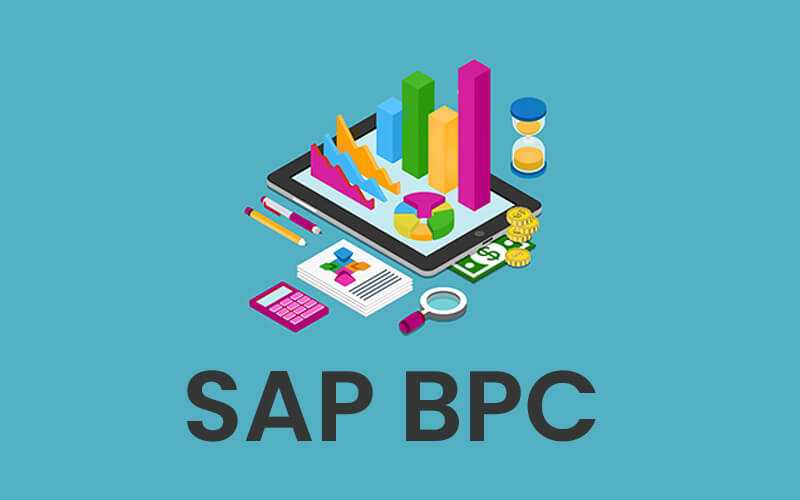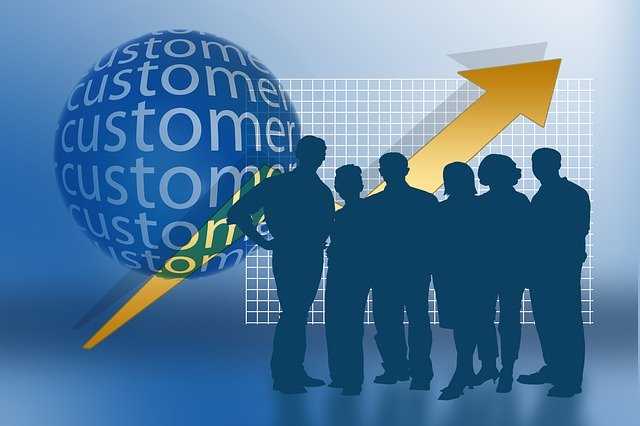SAP Customer Experience (CX)
Master SAP CX to deliver personalized, omnichannel customer experiences across sales, marketing, commerce, and service. Price Match Guarantee
Full Lifetime Access
Access on any Device
Technical Support
Secure Checkout
Course Completion Certificate
Price Match Guarantee
Full Lifetime Access
Access on any Device
Technical Support
Secure Checkout
Course Completion Certificate
 97% Started a new career
BUY THIS COURSE (
97% Started a new career
BUY THIS COURSE (GBP 12 GBP 29 )-
 87% Got a pay increase and promotion
87% Got a pay increase and promotion
Students also bought -
-

- SAP BPC (basic to advanced)
- 30 Hours
- GBP 12
- 199 Learners
-

- SAP S/4HANA Finance
- 20 Hours
- GBP 29
- 566 Learners
-

- SAP CRM (Customer Relationship Management)
- 25 Hours
- GBP 12
- 152 Learners

SAP Customer Experience (SAP CX) — formerly known as SAP C/4HANA — is SAP’s next-generation suite of cloud-based customer engagement and CRM solutions designed to help businesses manage and optimize every interaction across the customer lifecycle.
SAP CX unifies marketing, sales, commerce, service, and customer data management into a single platform that enables organizations to deliver personalized, consistent, and trusted experiences across all touchpoints.
In today’s digital economy, where customers expect seamless engagement and hyper-personalization, SAP CX empowers enterprises to build stronger relationships, boost loyalty, and accelerate growth through data-driven insights and intelligent automation.
This Mastering SAP CX Course by Uplatz provides a complete introduction to the SAP CX ecosystem, covering its architecture, modules, integrations, and real-world use cases. You’ll learn how to design, configure, and manage SAP CX solutions that improve customer satisfaction and business outcomes.
🔍 What is SAP Customer Experience (SAP CX)?
SAP CX is a comprehensive cloud suite that brings together multiple solutions to manage end-to-end customer relationships.
It replaces the traditional siloed CRM model with an integrated, experience-driven approach, ensuring that every department — from marketing to service — shares a single, real-time view of the customer.
SAP CX includes five core pillars:
-
SAP Marketing Cloud: Enables personalized campaigns, segmentation, and lead nurturing.
-
SAP Commerce Cloud: Provides omnichannel e-commerce and digital storefront experiences.
-
SAP Sales Cloud: Streamlines sales processes with automation, pipeline management, and AI insights.
-
SAP Service Cloud: Enhances post-sales support, ticketing, and customer care with intelligent tools.
-
SAP Customer Data Cloud: Ensures data privacy, consent management, and a unified customer identity.
By combining these solutions, SAP CX helps organizations connect data, processes, and experiences to deliver value at every customer interaction.
⚙️ How SAP CX Works
SAP CX operates as an integrated cloud-based CRM ecosystem, built on top of the SAP Business Technology Platform (BTP).
Here’s how it functions:
-
Data Unification: Collects and consolidates customer data from multiple touchpoints into a single source of truth.
-
Automation & Personalization: Uses AI and analytics to deliver tailored experiences, campaigns, and product recommendations.
-
Integration: Connects seamlessly with SAP S/4HANA, SAP BTP, and third-party tools (e.g., Salesforce, HubSpot) via APIs and SAP Integration Suite.
-
Real-Time Insights: Provides dashboards and KPIs for proactive engagement and decision-making.
-
Scalability & Security: Operates on a secure, cloud-native architecture with role-based access and GDPR compliance.
This unified model ensures that every department — from marketing to after-sales service — has access to consistent, real-time customer intelligence.
🏭 How SAP CX is Used in the Industry
SAP CX is used globally across industries to deliver exceptional customer experiences and measurable ROI.
Some common use cases include:
-
Retail & E-Commerce: Managing personalized product recommendations, promotions, and omnichannel checkout experiences.
-
Banking & Finance: Enhancing digital onboarding, customer loyalty, and cross-selling services.
-
Manufacturing: Streamlining dealer and partner management with better visibility into the customer journey.
-
Telecommunications: Enabling self-service portals, subscription management, and retention campaigns.
-
Healthcare & Life Sciences: Improving patient engagement, appointment scheduling, and compliance tracking.
Top enterprises like Nestlé, Adidas, L’Oréal, and BMW use SAP CX to strengthen customer relationships and maintain competitive advantage in fast-changing markets.
🌟 Benefits of Learning SAP CX
Learning SAP Customer Experience offers professionals a competitive edge in the global CRM and cloud application landscape.
Key Benefits Include:
-
High Industry Demand: SAP CX consultants and solution architects are among the most sought-after roles in CRM and marketing automation.
-
Cross-Functional Expertise: Master tools that connect sales, marketing, service, and commerce in one environment.
-
Customer-Centric Strategy: Learn to align technology with customer engagement and loyalty goals.
-
AI-Driven Insights: Gain skills to leverage data for predictive analytics and personalization.
-
Future-Proof Career: SAP CX forms the foundation for SAP’s Intelligent Enterprise strategy.
-
Global Opportunities: SAP CX is adopted by thousands of enterprises worldwide, creating diverse career paths.
By mastering SAP CX, you’ll develop the ability to architect customer journeys that convert interactions into long-term relationships.
📘 What You’ll Learn in This Course
This comprehensive course guides you through every major component of the SAP CX ecosystem. You’ll learn to:
-
Understand SAP CX architecture, deployment models, and service portfolio.
-
Explore core modules — Marketing Cloud, Sales Cloud, Service Cloud, and Commerce Cloud.
-
Manage customer data, privacy, and consent using the Customer Data Cloud.
-
Build omnichannel experiences across web, mobile, and social platforms.
-
Automate marketing and sales workflows using AI-driven analytics.
-
Integrate SAP CX with SAP S/4HANA, SAP BTP, and third-party systems.
-
Apply analytics, KPIs, and dashboards to measure customer success.
-
Implement service excellence strategies using SAP Service Cloud.
-
Work through enterprise-level case studies and configuration examples.
Each module includes real-world scenarios, project templates, and configuration labs to help you gain hands-on expertise.
🧠 How to Use This Course Effectively
-
Start with the Suite Overview: Learn about the SAP CX portfolio and how modules connect.
-
Explore Each Module Individually: Dive deeper into Sales, Service, Marketing, and Commerce Clouds.
-
Hands-On Practice: Use sandbox environments or case-based simulations to reinforce learning.
-
Understand Integration: Focus on connecting CX data with SAP S/4HANA and BTP services.
-
Revisit Analytics Modules: Strengthen understanding of data-driven decision-making.
-
Capstone Project: Design a complete CX strategy and implementation roadmap for a sample enterprise.
👩💻 Who Should Take This Course
This course is ideal for:
-
CRM Professionals transitioning to SAP’s customer engagement ecosystem.
-
Sales and Marketing Teams seeking to automate campaigns and improve conversion.
-
SAP Consultants specializing in cloud and CRM solutions.
-
Business Analysts & Strategists developing customer-centric transformation projects.
-
Students & Professionals exploring enterprise-level customer experience management.
-
Organizations aiming to deliver personalized, data-driven customer experiences.
No prior SAP CX experience is required, though a general understanding of CRM or SAP systems is beneficial.
🧩 Course Format and Certification
This self-paced course includes:
-
HD video lessons and real-world walkthroughs.
-
Module-based learning with interactive exercises.
-
Downloadable guides and hands-on practice templates.
-
Integration and configuration case studies.
-
Knowledge checks, assignments, and final capstone project.
Upon successful completion, you’ll receive a Course Completion Certificate from Uplatz — validating your expertise in SAP CX modules, customer data management, and omnichannel engagement.
🚀 Why This Course Stands Out
-
Complete Coverage: Covers all major SAP CX components in one structured program.
-
Hands-On Focus: Build practical skills in configuration, analytics, and integrations.
-
Real-World Context: Learn through industry use cases and enterprise examples.
-
Career-Oriented: Prepares you for roles in CRM consulting, digital marketing, and SAP solution delivery.
-
Aligned with SAP’s Intelligent Enterprise Vision: Understand how CX integrates with S/4HANA and BTP for end-to-end transformation.
This course ensures you not only understand SAP CX technically, but also know how to apply it strategically to deliver measurable business impact.
🌐 Final Takeaway
In the era of data-driven engagement, customer experience is the new competitive advantage.
SAP Customer Experience (SAP CX) provides the digital foundation for organizations to create meaningful, personalized, and trustworthy relationships with customers across every touchpoint.
The Mastering SAP CX Course by Uplatz equips you with the knowledge and tools to design, configure, and manage powerful customer experience ecosystems. You’ll gain expertise across marketing, commerce, service, and sales, learning how to integrate these into a unified, intelligent platform that drives engagement and growth.
Start today and become a specialist in SAP Customer Experience — where technology meets empathy to create customer success.
By completing this course, learners will:
-
Navigate the SAP CX suite and modules.
-
Configure customer data and identity management.
-
Automate marketing and lead management workflows.
-
Build commerce and sales processes in SAP CX.
-
Deliver customer support with SAP Service Cloud.
-
Use AI and analytics to personalize customer journeys.
Course Syllabus
Module 1: Introduction to SAP CX
-
What is SAP Customer Experience?
-
Evolution from SAP C/4HANA
-
CX suite overview
Module 2: Customer Data Cloud
-
Identity and access management
-
GDPR compliance and data privacy
-
Customer data orchestration
Module 3: SAP Marketing Cloud
-
Marketing automation and segmentation
-
Lead generation and nurturing
-
Campaign analytics and personalization
Module 4: SAP Commerce Cloud
-
Omnichannel commerce overview
-
Product content management
-
B2B and B2C commerce scenarios
-
Order orchestration
Module 5: SAP Sales Cloud
-
Lead and opportunity management
-
Sales forecasting and pipeline tracking
-
Integration with CRM and S/4HANA
Module 6: SAP Service Cloud
-
Case and ticket management
-
Omnichannel service support
-
Knowledge base and chatbots
-
Field service management
Module 7: Analytics & AI in CX
-
Customer journey analytics
-
Predictive insights with AI/ML
-
Experience-driven decision-making
Module 8: Integrations
-
SAP S/4HANA integration
-
SAP BTP and extension scenarios
-
Third-party tool integrations (CRM, e-commerce, analytics)
Module 9: Real-World Projects
-
Building an omnichannel customer engagement strategy
-
E-commerce setup with SAP Commerce Cloud
-
Marketing automation project in SAP Marketing Cloud
-
Customer service workflow with SAP Service Cloud
Module 10: Best Practices & Future Trends
-
Personalization at scale
-
CX in digital transformation
-
Future of SAP CX in AI and cloud-native systems
Learners will receive a Certificate of Completion from Uplatz, validating their expertise in SAP Customer Experience. This certification demonstrates readiness for roles in CRM, sales, marketing, commerce, and customer success.
SAP CX skills prepare learners for roles such as:
-
SAP CX Consultant
-
CRM Specialist
-
Sales & Marketing Technologist
-
E-Commerce Manager
-
Customer Success Engineer
SAP CX is being adopted by retail, manufacturing, financial services, and enterprises to deliver seamless, personalized experiences—making it a highly valuable enterprise skill.
1. What is SAP CX?
A suite of SAP cloud applications for customer engagement across marketing, commerce, sales, service, and data.
2. What are the main modules of SAP CX?
Customer Data Cloud, Marketing Cloud, Commerce Cloud, Sales Cloud, and Service Cloud.
3. How does SAP CX differ from traditional CRM?
SAP CX provides a holistic, data-driven, omnichannel experience, not just customer records management.
4. What is the role of Customer Data Cloud in SAP CX?
It manages customer identities, consent, and privacy in compliance with regulations like GDPR.
5. What is SAP Marketing Cloud used for?
For marketing automation, campaign management, lead generation, and personalization.
6. How does SAP Commerce Cloud support e-commerce?
By providing B2B/B2C commerce, product content management, and order orchestration.
7. What are the benefits of SAP Sales Cloud?
Improved lead-to-cash process, sales forecasting, and CRM integration.
8. What features does SAP Service Cloud provide?
Case management, omnichannel service, chatbots, and field service operations.
9. What are the benefits of SAP CX?
-
Omnichannel customer engagement
-
AI-driven personalization
-
Integration with SAP S/4HANA
-
Cloud scalability
10. Where is SAP CX being adopted?
By enterprises in retail, finance, telecom, and manufacturing to optimize customer journeys.









